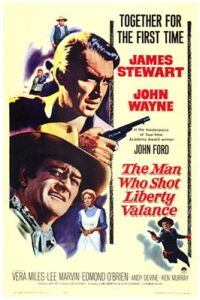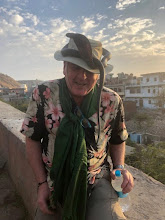
The Man Who Shot Liberty Valance is perhaps the quintessential American movie, and the quintessential unsung hero movie, in my opinion.
The bad guy, Valance, is shot dead during a gunfight with the hero of the piece, James Stewart, who goes on to become famous and respected, a pillar of society, and gets and marries the beautiful girl, as all heroes do. After all, a faint heart never won a fair maiden, even in The Old West. But there's only one problem: he isn't actually the man who shot the bad guy. The man who really shot the bad guy lives a lonely and embittered life, is a bit of an outcast, and doesn't get the girl. John Wayne (the secret hero) burns down the house he was building for her, realising he's lost her to a sophisticated and educated townie, and just stays quiet about the whole thing. Why? Because he'd saved the life of Stewart by shooting Valance from the shadows, rather than let him be killed by Valance, who's a superior shot. And if he owns up to killing a man that way, then he'd probably be on trial for murder himself. And besides, he knows that the town really does need some law and order, even if getting it requires bending the rules. So, by being the rescuer, he becomes the victim. There's no way out for him. He's sacrificed his own happiness for the love of those he cares about.
What's particularly interesting is the moral and political statement that the film makes. The James Stewart character is a believer in peaceful, legal actions to bring about a civilised society. He's a lawyer, and he wants to bring the law to town, and he wants nothing to do with guns. He wants reason to be the champion, not brutality and violence. John Wayne's character, however, proves by his own actions that peace can only be "won" through force, i.e. stopping Liberty Valance with a bullet. Even Stewart realises this in the film, much to his personal regret, as he's inexperienced with weapons and knows he faces certain death in a gunfight with Valance. But it comes to that in the film: Valance is Stewart's nemesis.
This is a terribly underrated film. To me, it personifies The American Way. Guns mean a great deal to many Americans, because the gun is a symbol of protection as a last resort - at least in theory. Some will tell you otherwise, of course.
I had a long discussion with a police officer (who'd actually just rescued me from the Mojave desert, but that's another story) about what guns mean to Americans in the US. Whilst he agreed that were there no guns, then no guns would be needed to protect us from them. But his argument was that the first people to surrender their guns during any gun recall would be the "good guys" - ie the law abiding citizens. The "bad guys" would hold on to them till the bitter end as far as he was concerned; and he had a point. Problem is - and I didn't actually point this out to him seeing as he was the cop and he had the gun - that many people view him as the bad guy, or at least the servant of the bad guy.
In an ideal world - James Stewart's world - guns can be thrown away, as they make no sense in a peaceful, intelligent, and loving world. Problem is, this isn't an ideal world. My experience has informed me that assertiveness, no matter how effective, honest and true, is meaningless without some kind of power to back it up. Even the Taoist and Buddhist masters recognise that, don't they? In another conversation I had with what one could call a redneck, it was explained to me that "It ain't who's right - it's who's left."
Think about that one for a moment or two: it's very Zen.
Something else that came up in the film was the nature of truth, and what it means to us in society. In one scene the newspaper editor, when he discovers the true identity of the man who shot Liberty Valance, advises all concerned that once a legend has been established you simply print the legend, regardless of its authenticity. "When the people believe the legend, print the legend", he says, tearing up a confession from James Stewart.
After all, what does it matter what the truth is when things are running OK?
In America, I've found, much as elsewhere in the world, nobody's that much bothered with the "real" truth - just the truth as far as it concerns them, and as far as they can be bothered to explore. Besides, I've found that truth has endless layers to it, so what is the truth, anyway? Again, another zen conundrum...
Right at the end of the film, when James Stewart's an old man and he and his wife go to John Waynes's funeral, and Stewart's discovered the lie about who shot Liberty Valance, the train conductor breezily exclaims (thinking he's passing a compliment) "Nothing's too good for the man who shot Liberty Valance!". The awful secret remains with Stewart still, compounded by the shame that his fame, fortune, respect; the love from his wife and his fine place in society are actually based on a lie.
Brilliant stuff!

Tuesday, April 05, 2005
The Man Who Shot Liberty Valance: It ain't who's right, it's who's left..
Posted by
Jack Lee
at
8:41 PM
![]()
Subscribe to:
Post Comments (Atom)

No comments:
Post a Comment